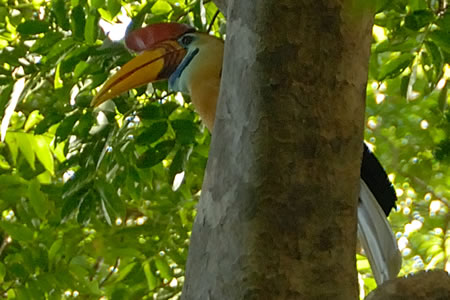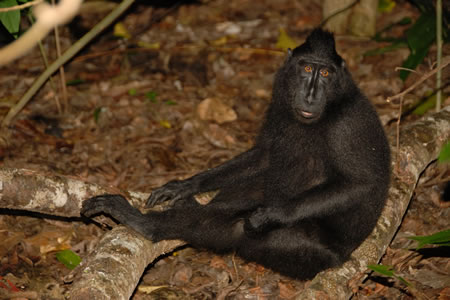English | Dutch |
|
| Sweat lip | |
Ubud (Indonesia) to Batuputih (Indonesia), Aug-21-08 / Sep-05-08 |
|
It is very hot and we are lying on our bed in a tiny room of a home stay in Batuputih, on the northern tip of the Indonesian island of Sulawesi. I just started writing this web log, while Ivonne with a sweat lip, is lying next to me writing her diary. The temperature is almost unbearable in Batuputih, despite the fact that the sun shows her self only once in a while. The luxury of a fan, not to mention air conditioning, is not available yet in this small fishing village. Last weeks, we spend most of our days on the island of Bunaken, just off the coast near the city of Manado. We went to that island to do our PADI Open water dive course. And as expected, it was really tremendous and we definitely want to do more diving in the future. Unfortunately, we had to say goodbye to the beautiful underwater world to proceed with our journey over land. That is also better for our budget, because diving is an expensive hobby. That’s probably the only disadvantage of diving. |
|
 |
|
An endemic Knobbed-Hornbill in the Tangkoko Nature Reserve |
|
| We travelled to this little village Batuputih because of the Tangkoko-Batuangas-Dua-Saudara Nature Reserve. This reserve seems to be one of the nicer reserves of Sulawesi. It is world famous, for those who know the reserve, for the Tarsiers. A Tarsier is a sort of nocturnal mini-monkey that looks a lot like E.T. (from the movie with the same name). And that isn’t strange if you know that Steven Spielberg was inspired by this little creature whose eyes are literally bigger than his stomach. Another reason to come to this reserve is the diversity of birds that you can see here, like the spectacular Knobbed-Hornbill. If you also know that many of the bird species are endemic, it isn’t difficult to predict that the reserve works like a magnet on international bird watchers. At this time also an English group stays in Batuputih. They travelled to this part of the world on a very expensive and exclusive bird watching holiday. Armed with guides, ultramodern equipment and tape recorders, they crawl the forest in search of special bird species, preferably endemics. These bird watching tours are especially popular among the older bird watchers. We always look at these groups with mixed feelings. We also like to spot wildlife, but the well being of the birds is more important to us than spotting the bird. These groups however, do everything to see the bird, including playing tapes. That means that they play a tape with the sound of the bird they want to see on it. If there is a bird in the area, he will come to have a look because he thinks that there is an intruder in his territory. If only one group does it once in a while, than there is no problem. But some parks are so popular, that the many bird watchers that visit the park with their tapes, stress the birds. In the evening, these groups go on a so-called night safari to watch the nocturnal birds like owls, frogmouths and nightjars. The tapes are used again and when they suspect that a bird is nearby, they use powerful torches to beam the birds almost literally out of the trees. All this is done to make their ‘seen’ bird list as long a possible. These people are not obsessed anymore by the birds, but by seeing as many and special birds as possible. And as often, also in this case fanaticism goes a step too far.
As mentioned, we spend much of our time last weeks on diving. We flew from Denpasar (Bali) to Manado (Sulawesi) with the airline Lion Air. We prefer to fly with Air Asia if possible, because we got to know this airline as a very efficient and reliable airline. But Air Asia is not flying between Denpasar and Manado, so we had to take another one. Lion Air wants to play in the same league as Air Asia, but there is still a long way to go for them. First of all it was impossible for us to book the tickets online, because credit cards issues in the west are not accepted by their system. Besides that, the flight that was sold to us as direct flight, made a stop over in Makassar where we had a two hour delay because we had to wait on one connecting passenger from Surabaya. But eventually, we safely arrived after midnight in Manado. We travelled the next day to the small island of Bunaken, just 40 minutes by boat away from Manado. We stayed on Bunaken for eleven days to relax and to do our PADI Open Water dive course (see also the article: Diving on Bunaken). The island is really a wonderful diving destination. As a matter of fact, the island isn’t much more than a couple of villages and a lot of diving resorts. However, the world under the sea level is amazing. Bunaken is mentioned by diving experts as one of the most beautiful diving spots in the world. If you swim into the sea from one of the beaches, the beautiful coral starts already after tens of metres. After a little bit less than hundred meters, you will arrive at a spectacular coral wall that dramatically drops hundreds of metres into the depth. Not only diving is spectacular, also the snorkelling quality is unheard of. The variety of fish is for us as laymen, impressive. Everything seems to be available, from the smaller Anemone’s, Lion fishes and Scorpion fishes, to the big Napoleon fishes, green Turtles, Barracuda’s and even Sharks. Also the life on the resort is very relaxed. It is great to spend some time away for the bustle of the mainland, in a sort of ‘all inclusive’ environment. Most of the visitors in the resorts come for a diving holiday to North Sulawesi. They have three weeks available, and spend these weeks on two or three different diving locations in the area. Despite the fact that most other divers are much more experienced than us, we really felt comfortable in the group. More strongly, it is sometimes great to discuss diving issues with people who have done already hundreds or thousands of dives. | |
 |
|
One of the many Black Macaques in the Tangkoko Reserve |
|
But as mentioned earlier, we had to leave the protected environment of the small island a couple of days ago, and are back on the mainland. The first thing we did was bringing a visit to the local Pizza Hut to enjoy the salad bar. It was time again to stock up with vitamins. Afterwards we travelled to the village of Batuputih, around three hours by public transport from Manado, to visit the Tangkoko-Batuangas-Dua-Saudara Nature Reserve. Especially the last stretch of the journey was fun. We had to take an open pick-up from the village of Girian to Batuputih. The pick-up is a small truck of which the cargo deck is used to transport people. The owner of the pick-up truck made some wooden benches in the back to seat approximately 20 passengers. There is no roof, so you have to bring an umbrella or other waterproofs to protect you against the rain. That is also what we did, because the dark clouds were already packed together above our pick-up. But fortunately, the rain broke out only a couple of minutes after we arrived in Batuputih. Tomorrow we travel back to Manado where we will decide what our next destination will be. It will probably be the Bogani Nani Wartabone Nationale Park, nearby the city of Gorontalo.
|
|
| <Previous weblog> | |